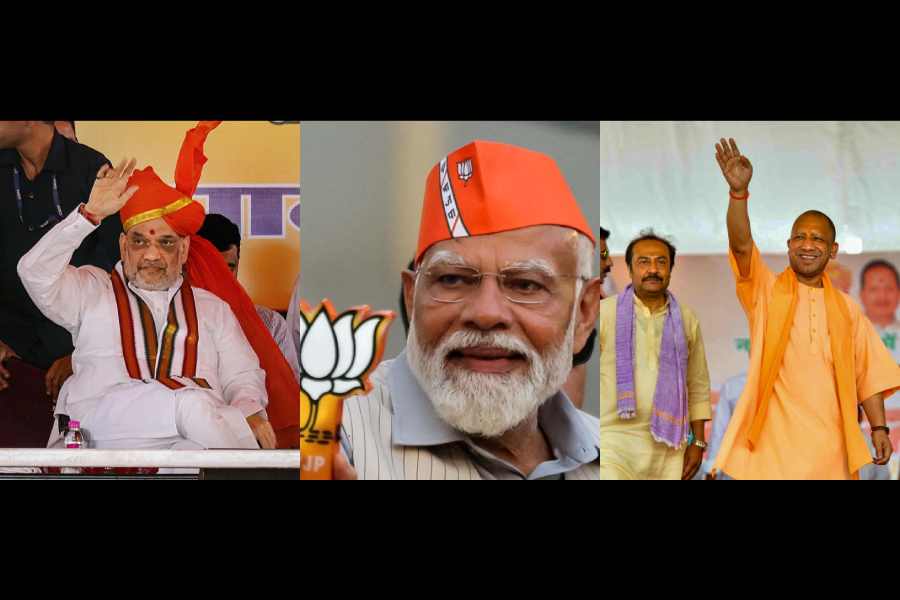Development has been sent to the back seat by Prime Minister Narendra Modi after the first round’s vote; polarisation has returned to drive his poll outings.
On Tuesday, he motioned on with the sectarian template he set in Rajasthan last Sunday, accusing the Congress of trying to give reservations to Muslims by reducing the quota of Scheduled Castes.
“When the Congress was in power, they wanted to give separate reservation to their special vote bank by breaking into the quota for Dalits, tribals and the backward classes,” Modi told an election rally in Rajasthan’s Tonk, stressing that the Constitution was firmly against religion-based reservations.
“Reservations provided by Babasaheb Ambedkar to Dalits, backwards and adivasis, the Congress wanted to give it to Muslims on the basis of religion,” Modi raged, claiming that after coming to power in 2004, the Congress had included Muslims within the SC/ST quota in Andhra Pradesh, which the Congress then ruled.
“This (Andhra Pradesh) was a pilot project that the Congress government wanted to implement across the country. They had tried to implement a Muslim reservation four times but could not because of legal hurdles and an alert Supreme Court,” Modi said, emphasising the Congress made such an attempt despite being aware that it was against the Constitution.
PTI reported Uttar Pradesh chief minister Adityanath telling a rally in Amroha: “The Congress and its allies have betrayed the country and have once again come to you with their false manifesto. If you look at the Congress’s manifesto, they say that if they form a government, we will implement Sharia law.”
The changed tenor of Modi’s campaign — and of other government and party seniors — owes at least in part to the low voter turnout in the first phase, some party insiders suggest.
Election analysts and experts often caution against reading too much into voter turnouts, arguing, with evidence, that they can work both ways; the BJP leadership, which has come to assume an over-enthused voter base in the Modi years, remains concerned.
Three top BJP leaders — home minister Amit Shah, party chief J.P. Nadda and general secretary (organisation) B.L. Santosh — met late on Monday night to try to analyse the reasons and impact of the dip in the voting percentage during the first phase of polling on Friday; the BJP is keen the downward voter turnout doesn’t become a trend in the remaining six phases of polling for the 18th Lok Sabha. Several BJP chief ministers and other key state leaders joined the meeting through videoconferencing to discuss ways to activate the party machinery to push up the voting percentage.
Compared to 2019, the overall voting percentage in the first phase dipped by some 4 per cent; the downward trend was much sharper in heartland states like Uttar Pradesh, Bihar and Rajasthan. The dip was over 4 per cent in Uttar Pradesh and Bihar and over 6 per cent in Rajasthan, where the BJP had won all 25 Lok Sabha seats in 2019.
Party leaders claimed one major reason for the lower turnout was a sense of “complacency” among the voters, the assumption that the Modi government was set to return to power comfortably.
“We feel that due to this complacency our cadres at the polling booth level did not work hard to get voters to cast their votes,” a BJP leader said. “The party leadership is now working on a strategy to ensure this complacency doesn’t hit us in the remaining phases,” the leader added.
Modi’s shrill tone after the first phase is also being seen as an effort to enthuse the party cadres and traditional BJP backers, apart from the wider strategy of shifting focus from the Opposition’s campaign which has been accusing the BJP of plotting to change the Constitution and take away quota benefits. Modi is now making a counter charge accusing the Opposition of trying to change the Constitution to appease their Muslim vote bank.
Party insiders said that the choice of Rajasthan was significant since it was one of the many heartland states the BJP had swept in 2019. This time, ground reports suggest that at least in half-a-dozen seats, the party was facing a challenge from the Congress. Also, the maximum impact of the Opposition’s campaign accusing Modi of planning to change the Constitution and withdraw reservations was being felt in Rajasthan, especially among tribals and Dalits.
Modi indicated as much in his Tonk speech on Tuesday. “Rajasthan’s strength is its unity. The state in the last elections had united to bless the BJP by giving all the 25 seats,” he said. “This time the Congress and the INDI alliance are trying to divide you and history has it that anti-national forces have taken advantage whenever we were disunited,” he argued.










